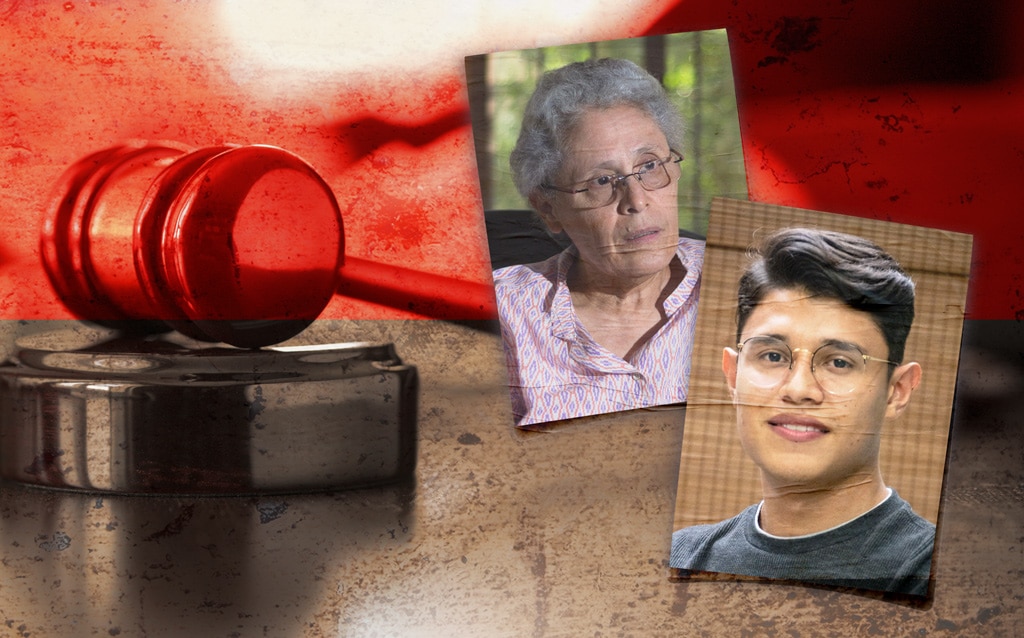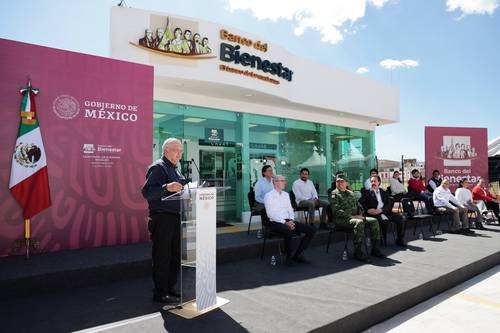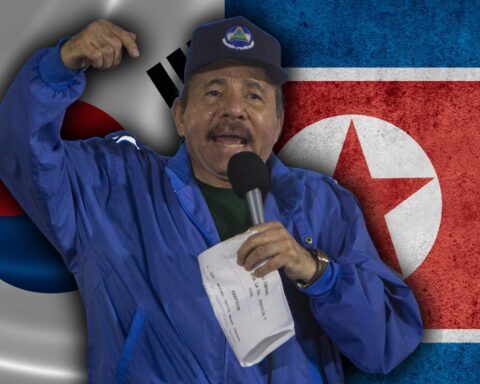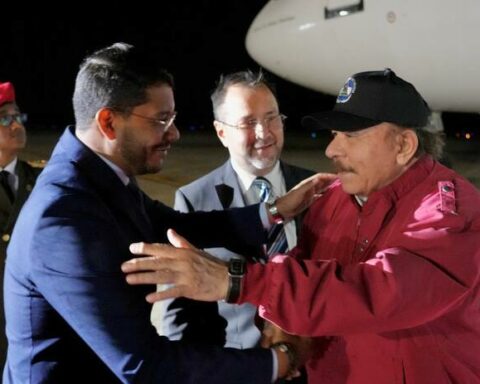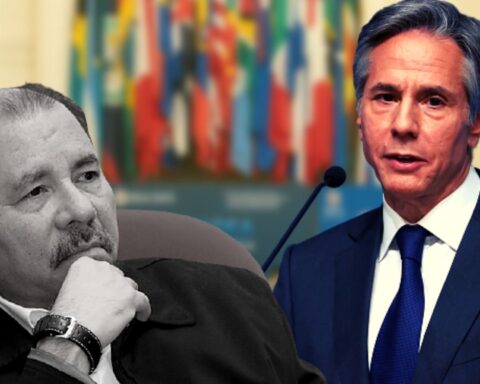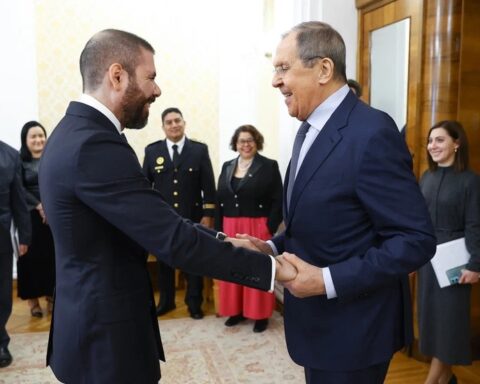The former guerrilla and founder of the Sandinista Renovating Movement, now the Renovating Democratic Union (Unamos), Dora María Téllez, and the student leader, Lesther Alemán, who in 2018 summoned Daniel Ortega, during the first national dialogue, to resign after the brutal repression against the April Rebellion, were found guilty by Ortega justice, accused of alleged “conspiracy to undermine national integrity to the detriment of the State of Nicaragua and Nicaraguan society.”
Téllez and Alemán arrived at the hearing of their respective trials without knowing that they would be tried, CONFIDENCIAL confirmed. Alemán did not have access to his lawyer before or during the process, while Téllez was only allowed to exchange a few minutes with his defense. The Prosecutor’s Office requested the maximum sentence of 15 years and disqualification from holding public office for both.
“His lawyer – Alemán – was not allowed to speak, challenge and question, he was constantly interrupted and forced to remain silent,” denounced the Nicaraguan University Alliance (AUN), in a statement. The lawyers of both political prisoners also did not have access to the minutes of the trial. In the case of the defense of the student leader, it was denied on “multiple occasions” by Judge Nadia Camila Tardencilla Rodríguez, in charge of the Second Criminal District Court of Hearings.
The Prosecutor’s Office uses Dora María’s retweets against him
The Public Ministry resorted to the testimony of four police officers. One of these, a computer technician, revealed that they use network monitoring software, through which they identify the interactions of people on Facebook, Twitter, Instagram and YouTube, confirmed this means of communication.
Among the evidence that the Prosecutor’s Office cited against the former guerrilla, there are rtweets by Téllez of publications by José Miguel Vivanco, former director of Human Rights Watch; a retweet from a particular person who had shared the letter that US senators they sent in June 2021, to President Joe Biden, urging him to take additional measures, in response to the intensification of the repression that Nicaragua is experiencing.
They also cited an alleged letter from the MRS, where Téllez’s name appeared, but not his signature, and which was identified on Twitter. The Prosecutor’s Office added two interviews that the historian gave to independent media and two participations at different times with members of the European Parliament.
According to the Prosecutor’s Office, the former guerrilla “called for a boycott against Nicaragua and for sanctions” during the aforementioned interventions. However, in these interviews, as he learned CONFIDENTIAL, Téllez refers to individual sanctions, which do not affect the integrity of the territory.
For its part, AUN denounced that the Public Ministry presented “a false Facebook profile, two videos of interviews and photographs that in no way can be evidence of crimes” against Alemán. They assure that the evidence presented in the trial of the student leader is “fabricated”.
“Prey or free I will continue fighting”
After more than four hours of trial, led by Ángel Jeancarlos Fernández González, Téllez intervened and demanded the violation of her rights for more than seven months of confinement, depriving her of interviews with her lawyers, family visits, reading, subjecting her to isolation and cold .
He emphasized that the State of Nicaragua should not be confused with the person of Daniel Ortega, and that neither “Daniel Ortega nor Rosario Murillo are the State of Nicaragua. This is a Republic, and not a monarchy. Prisoner or free, I will continue fighting”.
The same did not happen with Alemán, who was unable to defend himself even in his own trial. When he pointed out inconsistencies in the case filed against him, the Prosecutor’s Office demanded that the Ortega judge, even if it was his right, order him to “shut up.” The court agreed immediately and the young man only reiterated his innocence, assured AUN.
Alemán, 24, and a member of AUN, became involved in the social protests that broke out against the government in April 2018. He spent a year in exile and returned in 2019, “Assuming my own risks” pronounced when entering Nicaragua, since the possibility of being arrested was always latent for having faced the dictatorial couple.
On the night of July 5, 2021, Alemán was captured at his mother’s house, from where he was violently removed. During 214 days of confinement, the student leader has been subjected to constant interrogations, has lost some 30 pounds in weight, suffered from dizziness and looked malnourished, affirmed his mother, Lesbia Alfaro, after the visits in the “new Chipote”. She also accompanied him to the trial, where she saw him “serene and strong”.
Last January, AUN reported that Alemán suffered from constant pain in his right leg, which made it difficult for him to walk and sleep. Although he had received medical attention, the diagnosis of his discomfort was not known.
Vicious against ex-guerrilla
Daniel Ortega’s regime has taught Téllez since her violent capture on June 13, 2021, subjecting her to solitary confinement and permanent incommunicado detention. A situation that is repeated with the political prisoner and president of Unamos, Suyen Barahona; Ana Margarita Vijil, former president of Unamos and convicted of “conspiracy” last Wednesday, and Támara Dávila, member of the political council of the Blue and White National Unity (UNAB).
The prison treatment against the members of Unamos is considered as a “political revenge” of the Ortega regime for the role played by the then MRS, family members and human rights defenders assured last November in a piece published by CONFIDENTIAL.
Téllez, who in August 1978 led the negotiations to release 60 political prisoners from the Somoza dictatorship as part of the takeover of the National Palace, is currently a conscientious person, but from the Daniel Ortega dictatorship. After his dissent from the Sandinista Front, his voice became one of the most uncomfortable for the regime, pointing out its abuses of power and authoritarianism.
In an opinion article, Mónica Baltodano, also a Sandinista Front dissident, highlighted the “vengeful and despicable manner” that the regime has maintained against Téllez and called her impeachment of “an unscrupulous judicial process completely flawed and void of any nullity.”
“Dora María Téllez deserves to be respected and accompanied by all the honest citizens of Nicaragua. She is one of the most outstanding women in the fight against the Somocista dictatorship, and today she continues to be against the Ortega and Murillo dictatorship,” Baltodano highlighted in the text entitled To Dora María Téllez: The blue must not be touched
Trials in “the new Chipote” violate the law
The political trials reactivated by orders of Daniel Ortega They have been scheduled for the entire month of February against political prisoners, in the same facilities of “the new Chipote”, where dozens have been imprisoned since the end of May 2021.
However, carrying out these processes in the prison facilities constitutes one more of the illegalities of due process, according to the specialist in Criminal Law, María Asunción Moreno, in an interview with Tonight.
Lawyers who closely follow the cases against political prisoners agree with Moreno that judges cannot hold hearings outside the Judicial Complex, and that the exceptions established in article 121 of the Criminal Procedure Code only apply to “proceedings” that require the presence of the judge in his territorial jurisdiction. However, they maintain that the exception does not apply in the case of these political trials, because neither the defense nor the Prosecutor’s Office have requested that they be held in “the new Chipote,” the lawyer said.
The right to defense is violated
Another of the illegalities is that the defenders of political prisoners have not accessed their files – completely or partially – and they have not been able to talk freely with prisoners of conscience.
A lawyer who monitors political trials assured CONFIDENTIAL that in these processes the exercise of technical and material defense is being violated, contrary to article 124 of the Code of Criminal Procedure (CPP), which establishes that “the parties may obtain at their own expense simple copies of the judicial proceedings without any formality” .
Also, he added, article 34 of the Political Constitution of Nicaragua is violated, which in its item 4, demands that “their intervention and due defense be guaranteed from the beginning of the process or procedure and to have adequate time and means for their defense” .
In addition, this January 31, the Public Ministry violated the presumption of innocence of political prisoners, by calling them “criminals and delinquents” in a statement announcing the resumption of the trials.
“These same criminals and delinquents have reoffended, attacking the rights of the Nicaraguan people and society, compromising peace and security. They are the same ones that promoted and directed the terrorist acts of the failed coup attempt of 2018, having paralyzed the country and created damage to the economy; They are the same ones that have caused so much pain and mourning in the Nicaraguan family because of the murders, torture and kidnappings,” he published.
Likewise, Ortega already condemned the political prisoners on November 8, in his most virulent speech against political prisoners, in which he called them “sons of bitches of imperialism.”
They demand the release of political prisoners
The Ortega regime keeps more than 170 Nicaraguans imprisoned, and more than thirty of them remain in “the new Chipote”, under isolation, in punishment cells, suffering physical and psychological torture, according to their relatives, who have only managed to visit them on five occasions during the more than six months of confinement.
Relatives of more than 30 political prisoners demanded, at the end of January, the annulment of the trials and the unconditional release of all prisoners of conscience. In this way, they joined a previous statement, in which another group of relatives appealed for the support of “rulers, living forces of the nation and the (Catholic) Church” so that they “lead” a “citizen unification process”, highlighting that the release of prisoners of conscience would serve “as a kind of liberation shared by all Nicaraguans.”
After the communiqués, the Superior Council of Private Enterprise (Cosep), which had been silent since September 2021, supported the demand for the freedom of prisoners of conscience, and announced its willingness in favor of a national dialogue “without preconditions”, in in the midst of the worst legitimacy crisis of the Ortega regime, which previously announced meetings with different economic sectors, without mentioning COSEP.
Among the 39 political prisoners captured between May 28 and October 21 (including four under house arrest), 29 are accused of alleged conspiracy to undermine; another seven are accused of money laundering and other crimes; two are investigated for violations of the “Sovereignty Law” and one for abusive management and improper appropriation and retention.
The regime has used against the opposition the package of repressive laws that they approved between October 2020 and February 2021, the most used so far being the Law 1055 o Law for the Defense of the Rights of the People to Independence, Sovereignty and Self-determination for Peace, better known as the “Sovereignty Law”, which facilitated the imprisonment of seven presidential candidates, as well as political, civic, student, peasant, and former diplomat leaders. , journalists, active, professionals and human rights defenders.
It has also used the Special Cybercrime Law, known as “Gag Law”, approved on October 27, 2020, which penalizes whoever -according to the regime’s criteria- spreads “false news”. Thus, the Prosecutor’s Office convicted Donald Margarito Alvarenga and Douglas Cerros Lanzas in January. Alvarenga was convicted of allegedly inciting “hate and violence” through Facebook posts and WhatsApp messages and for “subversion, disobedience and rebellion at the level of conspiracy to affect national integrity”; and Cerros for allegedly undermining national integrity and spreading false news.

